Malaria Prevention
Get In Touch
Call Now
Monday to Friday
9:00 AM To 6:00 PM
Saturday and Sunday
Closed
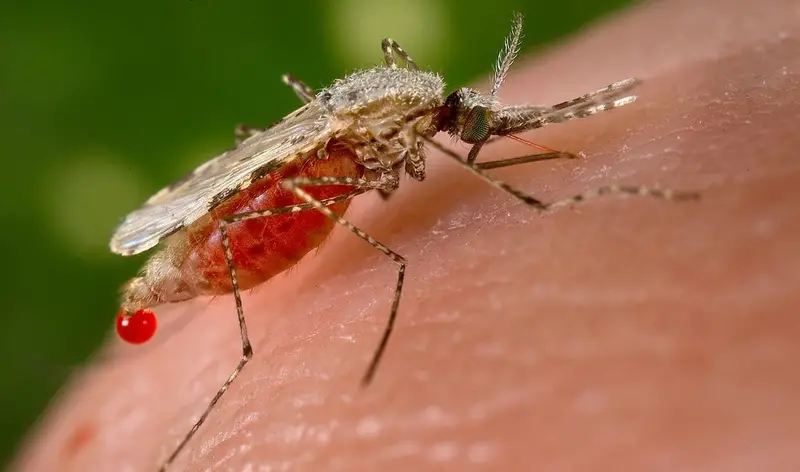
Malaria
- Malaria is a mosquito born parasitic disease that affects humans and other animals. Symptoms usually begin ten to fifteen days after being bitten by an infected mosquito. If not properly treated, people may have recurrences of the disease months later. In those who have recently survived an infection, reinfection usually causes milder symptoms. Malaria can also be transmitted from a mother to her unborn baby (congenitally) and by blood transfusions. Malaria can be carried by mosquitoes in temperate climates, but the parasite disappears over the winter. The disease is a major health problem in much of the tropics and subtropics. The CDC estimates that there are 300-500 million cases of malaria each year, and more than 1 million people die. It presents a major disease hazard for travelers to warm climates.
Causes
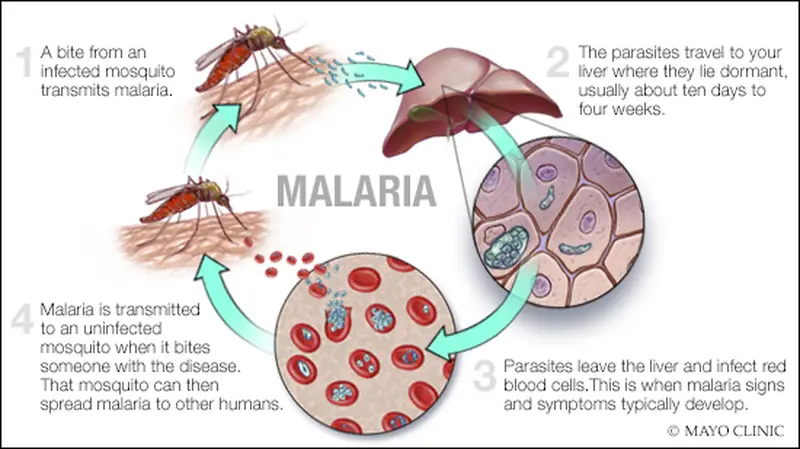
- Malaria is caused by a parasite that is transmitted from one human to another by the bite of infected Anopheles mosquitoes.
- In humans, the parasites (Sporozoites) travel to the liver, where they mature and release another form, Merozoites.
- These enter the bloodstream and infect the red blood cells.
- The parasites multiply inside the red blood cells, which then rupture within 48 to 72 hours, infecting more red blood cells.
Symptoms
- The first symptoms usually occur 10 days to 4 weeks after infection, though they can appear as early as 8 days or as long as a year after infection.
- Then the symptoms occur in cycles of 48 to 72 hours.
- Most symptoms are caused by:
- The massive release of merozoites into the bloodstream.
- The anemia resulting from the destruction of the red blood cells.
- Jaundice problem caused by large amounts of free hemoglobin released into circulation after red blood (Hemolytic Anemia).
- Symptoms Include:
| Chills | Anemia | Convulsion | Fever | Headache | Jaundice | Muscle pain | Nausea | Sweating |
| Vomiting, coma and Death |
Signs and Tests
- During a physical examination, the doctor may identify an enlarged liver or an enlarged spleen.
- Malaria blood smears taken at 6 to 12 hour intervals confirm the diagnosis.
Treatment
- Malaria, especially Falciparum malaria, is a medical emergency requiring hospitalization.
- Chloroquine is a frequently used anti-malarial medication,
- Quinidine (Quinine) plus Doxycycline, Tetracycline,
- Atovaquone plus proguanil (Malarone); Artesunate;
- The combination of Pyrimethamine + Sulfadoxine, are given for chloroquine-resistant infections.
- The choice of medication depends in part on where you were when you were infected.
- Aggressive supportive medical care, including intravenous (IV) fluids and other medications and breathing (respiratory) support may be needed.
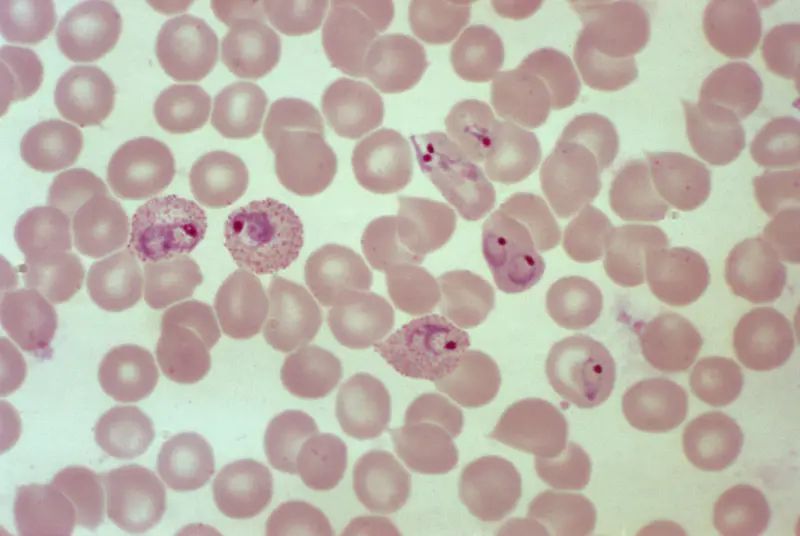
Prevention
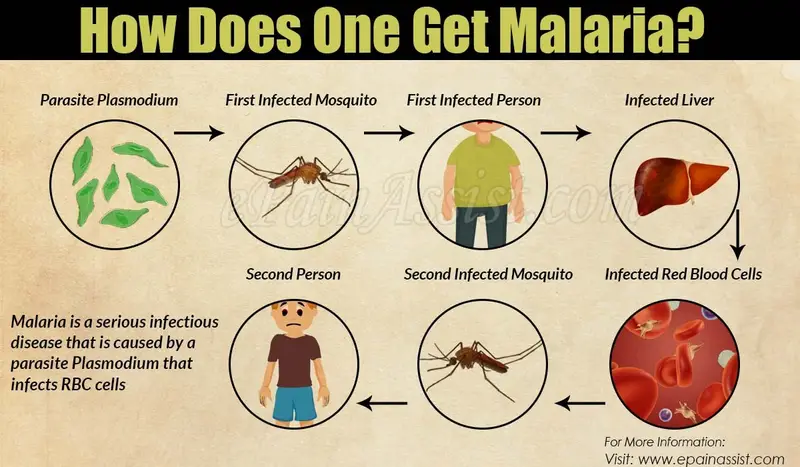
- Most people living in areas where malaria is common have acquired some immunity to the disease.
- Visitors will not have immunity and should take preventive medications.
- It is important to see your health care provider well before your trip, because treatment may begin is long as 2 weeks before travel to the area, and continue for a month after you leave the area.
- The types of anti-malarial medications prescribed will depend on the area you visit.
- According to the CDC, travelers to South America, Africa, the Indian subcontinent, Asia, and the South Pacific should take one of the following drugs: Melfoquine, Doxycycline, Chloroquine, Hydroxychloroquine, or Malarone.
- Even pregnant women should take preventive medications because the risk to the fetus from the medication is less than the risk of acquiring a congenital infection.
- People on anti-malarial medications may still become infected. Avoid mosquito bites by wearing protective clothing over the arms and legs, using screens on windows, and using insect repellent.
- In some areas of the world, mosquitoes that carry malaria have developed resistance to insecticides.
- In addition, the parasites have developed resistance to some antibiotics. This has led to difficulty in controlling both the rate of infection and spread of this disease.
- Falciparum malaria, one of four different types of malaria, affects a greater proportion of the red blood cells than the other types and is much more serious. It can be fatal within a few hours of the first symptoms.
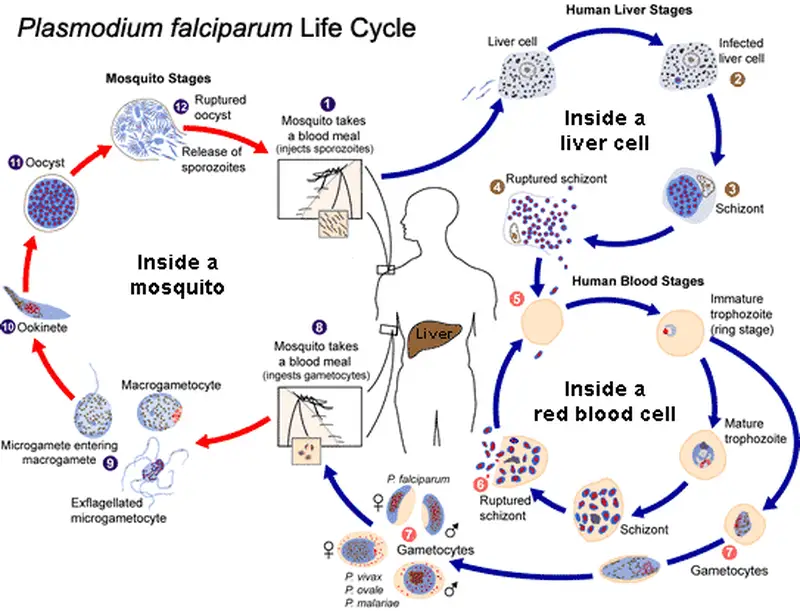
What Patients Say
Our Testimonials
Why patients trust Dr. Farah with their health

Came in with a headache and started to feel sick. Had a big trip for New Years, therefore I had to solve my problems quickly. Dr. Farah helped me right away and treated all my problems, he saved my weekend. Will come here again soon.
Melanie Warner

I was in a lot of pain and I walked in and the receptionist was so lovely. I was into see the doctor within five minutes and he listened to me and was wonderful. I’ve been to a few urgent cares and this one by far is the best !
Tiffany Lee-Frank

I absolutely love Dr Farah and his whole staff on the medical and the spa side. I’m not just saying this, Dr Farah has been my doctor over 10 years and I’ve been using his Rejuvenate spa for about 4 years now. I would give them 10 stars if I could!!!
Lori Brooks

Ashley and Anna are friendly and made me feel welcome and at ease. Dr. Farah was very understanding and answered all my stupid questions. They were all very professional and patient with me.
juli ross
Providing Urgent Care for non-life-threatening health complications

Urgent care services
Monday to Friday
9:00 AM To 6:00 PM
Saturday and Sunday
Closed
17130 Ventura Boulevard,
Encino California 91316






